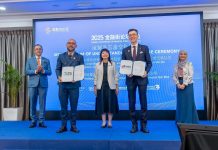No longer being just a buzzword, sustainability in businesses has become more prevalent and urgent due to the increased expectations on businesses by consumers as well as investors to be committed to creating long-term value by taking into consideration how an organisation operates in the ecological, social and economic environment.
Understanding the urgency for Johor based companies to adapt to the global sustainability movement, the newly setup Johor office of the UN Global Compact Network Malaysia & Brunei (UNGCMYB) which is the local network of the United Nations Global Compact (UNGC) teamed up with PwC Malaysia (Johor office) to host a Johor CEOs Sustainability Virtual Roundtable themed ‘Using Best Practices for Better Growth’ to get the conversation started.
“The awareness of, and attitude towards the world’s environmental, social and governance has shifted. The question now is not just about development but on sustainable development,” said Edey Suresh, Johor State Director of the UN Global Compact Network Malaysia & Brunei (UNGCMYB).
The virtual roundtable received an overwhelming response as CEOs and key personnel from various industries consisting of Bahagian Perancang Ekonomi Negeri Johor (BPEN), Educity Iskandar Malaysia, Invest Johor, Iskandar Regional Development Authority (IRDA), Iskandar Investment Berhad (IIB), Iskandar Halal Park, Kulim (Malaysia) Berhad, Kumpulan Prasarana Rakyat Johor (KPRJ), Marrybrown, Regency Specialist Hospital, Sunway Iskandar and UMLAND Seri Austin were in attendance.
“PwC Malaysia (Johor office) is proud to play its part in raising awareness of ESG amongst the public and private sectors in Johor. The Decade of Action (2020-2030) initiative by the United Nations to deliver the 17 SDGs requires C-suite management and top civil servants to immediately start developing strategies for business and regulatory transformation. These strategies should encompass areas such as climate change, sustainable value chains, responsible investment and sustainable finance, with corporate, financial and sustainability reporting being realigned as a result,” said Manohar Johnson, PwC Assurance Partner in Johor.
Johor’s economy has grown tremendously over the past several years. The development has attributed to the growing industrialisation and diversification of its economy base. Johor based companies were however not reaping the benefits of sustainability such as attracting sustainable investors or applying for sustainable linked loans which is now available at most major banks.
UNGCMYB’s Johor office is set up specifically to enable companies to gain access to the UNGC Academy, tools, network and other expertise offered by the UN Global Compact for companies looking to further their sustainability ambitions.
The roundtable provided expert insight for the CEOs as speakers from PwC Malaysia, UNGCMYB and OCBC Bank took turns to explain the principles of the 17 Sustainable Development Goals (SDGs), Environment, Social and Governance (ESG), financial benefits from sustainable practices as well as collective actions for the state’s private sector and government agencies.
“Our goal was to give the CEOs useful insights that they will need to align sustainability into their business strategy and to pivot them to become a transformative leader who can unite a deep sense of purpose while advancing their business savvy,” added Edey Suresh.
The CEO Roundtable series will be organised throughout the year by UNGCMYB (Johor office) amongst the other programmes and engagements they have planned for the state of Johor for corporations, GLCs, SMEs and business chambers to get involved.
The United Nations Global Compact has 68 local network offices worldwide currently with over 16000 companies as members. It calls for companies to align their operations and strategies with ten universal principles in the areas of human rights, labour, environment, and anti-corruption, and to take action in support of UN goals and issues embodied in the Sustainable Development Goals (SDGs).




